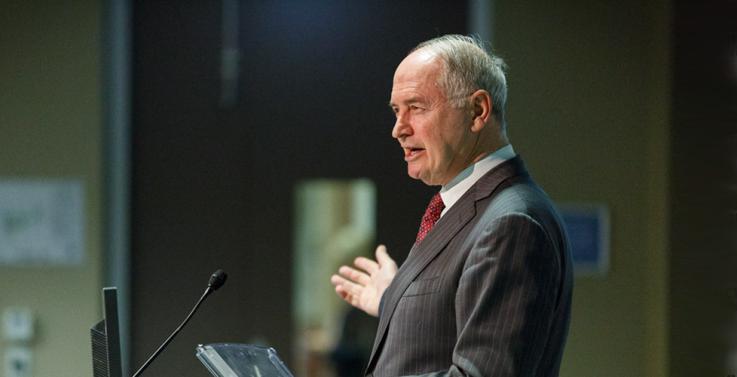
Professor Ross Garnaut has warned of tough economic times ahead as the China resources boom ends.
The distinguished Professor Garnaut was speaking at the annual Vice-Chancellor's Lecture entitled 'Ending the great Australian complacency' at Victoria University on May 28.
Professor Garnaut's lecture laid out economic realities that face Australians at the end of the China resources boom 2003-11 and the Australian long boom 1991-2012. He discussed the policy responses that would avoid the most damaging possibilities, and the immense changes in political culture that are necessary for the Australian success of the past two decades to continue into the future.
"Australians are still enjoying the longest economic expansion unbroken by recession of any developed country at any time. This Australian long boom has taken average incomes converted into international currency to well above the United States, the European Union and Japan, from well below the average of the developed world," he said.
We owed this widely based prosperity to both good policy, well implemented, and good fortune, he said.
"For the first few years of the new century, poor policy kept growth going at a rapid rate by stimulating an unsustainable housing and consumption boom funded by the commercial banks' borrowings in overseas wholesale debt markets," he said.
"We were saved from unhappy consequences of the housing and consumption boom by the China resources boom, with huge increases in export prices adding to average incomes and employment from 2003 and unprecedented levels of resources investment augmenting the bounty from about 2005."
"But with the end of the China resources boom, Australians face a sharp deterioration in all dimensions of their material living standards unless we can move swiftly to rapid expansion of investment in and exports from the non-resources trade-exposed industries— services, rural products, manufactures. Investment and exports in all of the non-resources trade-exposed industries are in decline, on the back of the strong real exchange rate."
Professor Garnaut said the real exchange rate would have to come down a long way and quickly if the markets are not to impose their own large retrenchment on Australians, damaging disproportionately a large number of people who lose their jobs or are who want paid work and are unable to find it.
"It will not be an easy task to secure the timely economic adjustment that is necessary to avoid deep recession," he said.
"Avoiding deep recession and high unemployment will require some technical dexterity amongst political advisers—securing policies that reduce the nominal exchange rate and turn it into a real exchange rate depreciation. That will require many of us to accept that price increases from a fall in the value of the dollar will not be compensated by an increase in incomes."
He said the loss of living standards in the adjustment process would be less the more we accepted wide-ranging productivity-increasing policy change that characterised reforms in the late twentieth century.
That, in turn, requires individual business to accept that they have no right to compensation for the withdrawal of benefits from bad regulatory policies that are changed to raise national productivity, he said.
"Avoiding deep recession and high unemployment will require members of our society to be willing to share equitably a moderate reduction in material living standards, to avoid inequitable distribution of a large reduction. It will require a radical change in the role of interest groups in the policy process that has emerged during The Great Australian Complacency. Business and union and other interest groups will have to learn again to argue their contributions to national policy in genuine public interest terms, or Government will need to learn to ignore them," Professor Garnaut said.
"Hardest of all, Australians whose expectations of steadily rising after-tax incomes and services have increased beyond reasonable limits over the past dozen years, will have to accept that even current average levels of expenditure cannot be sustained through an adjustment period."
Listen to Professor Garnaut's speech from the lecture, download a copy of the speech and slides, or download just the slides.
